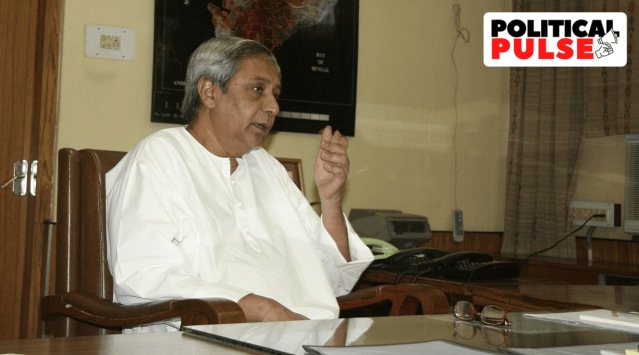Latest Comment
Post Comment
Read Comments
 Sources said that Naveen Patnaik does not want to take risks by pushing any decision that might fuel people’s protests or dent the BJD government’s image. (Express photo by Partha Paul)
Sources said that Naveen Patnaik does not want to take risks by pushing any decision that might fuel people’s protests or dent the BJD government’s image. (Express photo by Partha Paul) Barely nine days after tabling a land acquisition Bill in the Odisha Assembly, the Naveen Patnaik-led BJD government withdrew it along with two other Bills on March 31, when the budget session ended six days behind its original schedule.
While the government did not give any reasons for its move to withdraw these Bills, official sources said it was CM Patnaik’s decision as he feared that certain clauses in the land acquisition Bill might trigger people’s resentment, even as he took into account Odisha’s history of strident protests, marked with violence and police firing in several incidents, against the acquisition of land of farmers and certain vulnerable communities like tribals in the state.
Sources said that Patnaik does not want to take risks by pushing any decision that might fuel people’s protests or dent the BJD government’s image in the run-up to the Lok Sabha and state Assembly polls, which are both due in April-May 2024.
Odisha revenue and disaster management minister Pramila Mallik, who had introduced the land acquisition Bill on March 22, said while withdrawing the Bill on March 31 that the government wanted to review some of its provisions.
“The government felt that there is a need to review and modify some of the provisions in the Bill. It will be introduced with some modifications,” Mallik told The Indian Express.
When asked whether the government will wait for the next session — the monsoon session slated for September — to introduce the modified Bill or take the ordinance route for its implementation, the revenue minister said, “The government will take a call on it.”
Besides the land acquisition Bill, the Patnaik government also withdrew the Odisha State Commission for Backward Classes (amendment) Bill, 2023 and the Odisha Apartment (ownership and management) Bill, 2023.
Explaining the rationale for withdrawing the land acquisition Bill, a senior government official said that if the government had not withdrawn the bill, it would not have been in a position to make any changes and bring any ordinance.
“The state government has been pushing hard to attract private investments in mega projects across sectors to fast-track the development process. Providing hassle-free land to projects is government’s responsibility. But we want peaceful industrialisation,” the official said on condition of anonymity.
The Right to Fair Compensation and Transparency in Land Acquisition, Rehabilitation and Resettlement (Odisha Amendment) Bill 2023, which was withdrawn, proposes to amend the Centre’s Right to Fair Compensation and Transparency in Land Acquisition, Rehabilitation and Resettlement Act 2013.
It proposes to exempt the mandatory social impact assessment (SIA) study for certain categories of projects on the ground that this delays the land acquisition process. It also proposes to acquire the multi-crop irrigated land for certain industrial and infrastructure projects.
These provisions in the Bill are meant for projects which are vital for national security or defence of India, infrastructure projects, including educational institutions, health infrastructure, government offices, electrification, irrigation projects and drinking water projects. Similarly, projects like affordable housing, industrial corridors set up by the state government, infrastructure projects, including highways and railways, and industrial projects involving displacement of 100 families or less, or acquisition of private land of 500 acres or less are also covered under the bill.
“The government is likely to modify the provision relating to acquisition of multi-crop irrigated land for the above-mentioned projects. The decision to insert new provision to withdraw the consent for acquisition of land in non-scheduled area may also be revisited,” said the official.
Significantly, the Narendra Modi-led central government was also forced to let its ordinance to amend the land acquisition Act 2013, passed during the previous Congress-led UPA government, lapse in 2015 in the wake of widespread protests from various quarters including the Opposition parties.
Over the last few decades Odisha has witnessed several major protests over land acquisition for various industrial and infrastructure projects, which have also involved violence and police firing at times.
South Korean steel giant Posco had backed out of its proposed steel plant project in Dhinkia village near Paradip in 2017 owing to delay in land acquisition.
The world’s largest steel producer ArcelorMittal had scrapped its steel plant project in Keonjhar in 2013 due to delay in land acquisition following local protests. It has now made fresh entry into Odisha by forming a joint venture with Japan’s Nippon Steel to set up a steel mill in Kendrapada.
Vedanta’s proposed bauxite mining project in Niyamgiri hill, inhabited by the Dongoria Kondh tribals, was scrapped after all the 12 gram sabha meetings, which were held following the Supreme Court’s April 18, 2013 ruling to give them the right to decide, rejected the mining project.
On January 2, 2006, as many as 14 tribals, including three women, were killed in police firing at Kalinganagar in Jajpur when they were protesting against the Tata Steel’s plant, which was later set up there.
On December 16, 2000, three tribals were killed and several injured at Maikanch in Rayagada after police fired on locals protesting against bauxite mining and construction of an alumina refinery by Utkal Alumina International Ltd, a subsidiary of the Hindalco industries. This refinery was also established subsequently.




